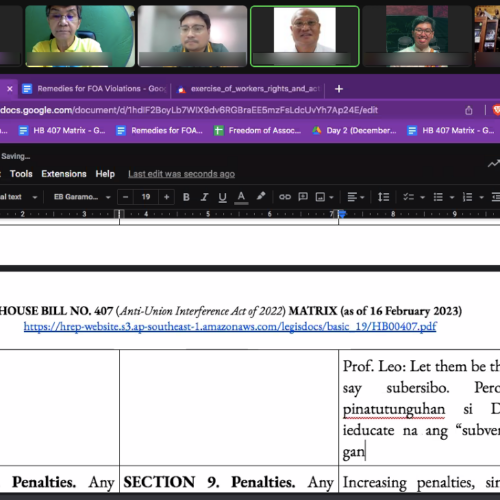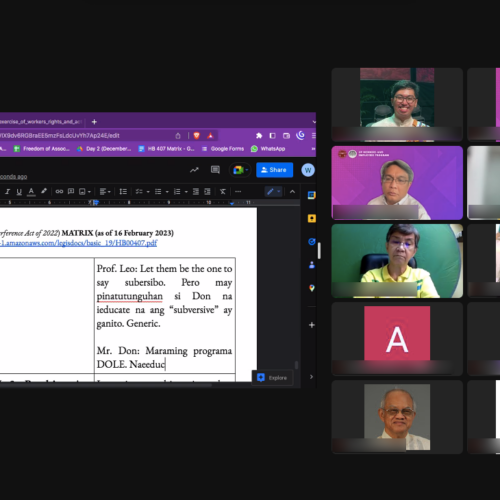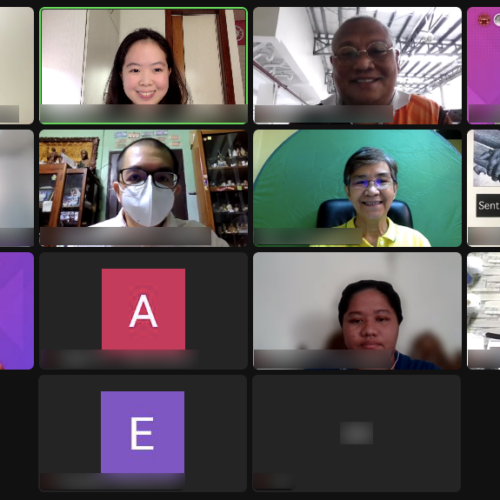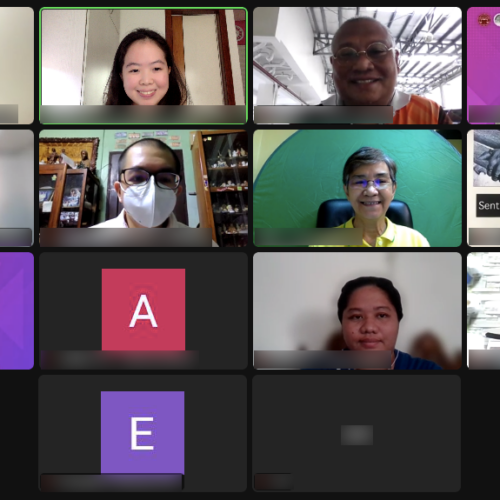Workers and Employees Program (WEP) holds 11th Round Table Discussion on Freedom of Association
The Workers and Employees Program (WEP) of the University of the Philippines College of Law/Law Center conducted a virtual Round Table Discussion (RTD) on 4 March 2023. This marks the second (2nd) RTD on Freedom of Association (FOA), and the eleventh (11th) RTD of WEP since it was established in June 2021. While the last RTD served to establish the rationale and context on FOA in the Philippines today, the latest RTD provided a platform for concerned labor organizations to propose measures that would strengthen the protections to FOA contained in House Bill No. (H.B.) 407, otherwise known as the proposed Anti-Union Interference Act of 2022.
In her pre-recorded welcome remarks, WEP Program Director Patricia R.P. Salvador Daway briefly summarized the matters covered by the first FOA RTD on 18 February 2023, specifically the urgent concerns of workers related to union red-tagging, surveillance, threats, harassments, arrests, and violence, including forced disappearances and extrajudicial killings, despite the existence of International Labour Organization (ILO) Conventions, the 1987 Constitution, as well as the Labor Code of the Philippines, which embody provisions that guarantee the protection of workers’ right to freedom of association and the right to self-organization. In considering the coverage of H.B. 407, Prof. Daway observed that the proposed provision on the complaint mechanism does not elaborate on the remedies available to victims of FOA interferences. The objective of the 2nd FOA RTD was to discuss and identify legal remedies that will be clearly available to workers who suffer any interferences in the exercise of their right to self-organization and FOA. The remarks ended with an encouragement for the participants to propose revisions, which will be transmitted to the principal authors of H.B. 407.
Participants
The RTD was attended by representatives from the Department of Labor and Employment Bureau of Labor Relations (DOLE-BLR), the Office of Representative Arlene Brosas of GABRIELA Women’s Party, the Ecumenical Institute for Labor Education and Research (EILER), Center for Trade Union and Human Rights (CTUHR), Crispin B. Beltran Resource Center (CBBRC), Trade Union Congress of the Philippines (TUCP), Sentro ng Alternatibong Lingap Panlegal (SALIGAN), Philippine Metalworkers’ Alliance (PMA), Philippine Society of Construction Safety Practitioners (PSCSP), and the Institute for Occupational Health Safety and Development(IOHSAD).
Plenary
Professor E. (Leo) Battad and Professor Arnold F. De Vera facilitated the plenary session, with the objective of identifying any necessary revisions to H.B. 407.
The construction and formulation of the provisions were given great significance, in order to avoid potential misinterpretation of or miscategorization due to the wording of the law. Another concern was that there should be a clear distinction between interfering with FOA versus a valid expression of the right. The facilitators emphasized that it was imperative that the latter remain protected.
Declaration of Policy
Atty. Maya Abdullah from SALIGAN proposed the inclusion of the policy statement in the existing Guidelines on the Conduct of the DOLE, DILG, DND, DOJ, AFP and PNP Relative to the Exercise of Workers’ Rights and Activities (Guidelines) which is, “ensure the effective exercise of trade union rights and the prevention of violations of workers’ rights, in a climate free from violence, pressure, fear and duress of any kind from any organization”.
Prof. Battad suggested that ILO Convention No. 87 (Freedom of Association and Protection of the Right to Organise Convention) and No. 98 (Right to Organise and Collective Bargaining Convention) be cited, being treaty obligations.
Prohibited Acts
Since FOA protects both the right to join and not join a union, the positive and negative aspect of FOA, WEP proposed that H.B. 407 should prohibit any act requiring, forcing or coercing a worker to join or not join a workers’ organization or union.
On discussing the prohibition on requiring attendance to information drives which encourage or dissuade from participating in unions, Prof. De Vera suggested that the distinctions made on Unfair Labor Practices found in Title VI of the Labor Code could aid in the discussion. Deputy Director Kamz Deligente from CTUHR agreed, and added that healthy competition between unions may be affected by the bill if the prohibited acts are not properly distinguished.
Atty. Jasper Frederick Briones of WEP pointed out that H.B. 407 punishes specific acts committed by “any person”, as compared to Title VI of the Labor Code, which distinguishes Unfair Labor Practices done by employers from those done by Labour Organizations. The best course of action would be to do a side-by-side comparison, reconciling certain provisions and taking note of any overlaps or any provisions which should be harmonized between H.B. 407 and the Labor Code.
Prof. Battad and Prof. De Vera agreed that the phrasing of the prohibited acts under the bill consider Article 259 of the Labor Code (Unfair Labor Practices of Employers) and the Guidelines, to avoid confusion on what prohibited acts apply to employers, to state agents, and to labor organizations. The prohibited acts can be classified per offender, or qualifications or exceptions can be stated to prevent penalizing legitimate exercise of FOA.
Mr. Don R. Orido, President of PSCSP, raised that one of the prohibited acts, interfering with the performance of union duties, should be qualified as the same may not be violative of FOA if the union duties were performed during work hours. Atty. Abdullah noted that there have been cases of union leaves being credited as other leaves. While not a direct threat, this practice disincentivizes workers from engaging in union activities, which is union busting.
On defining red-tagging as a prohibited act, WEP looked into various documented cases of red-tagging from 2016. The dissent of Justice Leonen in the 2015 case of Zarate v. Aquino, wherein he cited a journal article to define red-tagging, was noted. However, the participants agreed that a further perusal of how red-tagging has developed is needed in order to develop a proper definition for H.B. 407.
Ms. Rochelle Porras, Executive Director of EILER, recounted that there have been reports of red-tagging resulting in union disaffiliation or a forced change in its officers. She added that red-tagging is commonly followed by infiltration by the employer. The consensus was that there is need for a catch-all provision, to avoid any gray areas on defining red-tagging.
Conduct of State Agents
Section 6 covered the Conduct of the Armed Forces of the Philippines (AFP), Philippine National Police (PNP), and the National Task Force to End Local Communist Armed Conflict (NTF-ELCAC). Apart from the suggestion that “any member” should be changed to “No member” given that the subject matter focuses on prohibited acts, Prof. De Vera opined that the entities enumerated in the provision should use the widest possible terminology in order to cover any and all entities under these three bodies. For instance, the phrases “Economic Zone police” and “PEZA security personnel/guards” could potentially leave out “Economic Zone security personnel/guards” and “PEZA police”.
He noted that, Section 6 would be one of the bill’s greatest contributions, as it specifies and holds accountable the enumerated state agents in case they commit any of the prohibited acts. In order to guarantee this, Prof. Battad recommended that there be a catch-all provision in order to assure that the provisions of Sec. 5 also apply to these state agents.
Complaint Mechanism
Bureau of Labor Relations Department of Labor and Employment (BLR DOLE) Mediator-Arbiter Atty. Joharic A. Maligaya said that the BLR has drafted a compendium of opinions which is pending approval.
Med-Arbiter Maligaya further explained that in DOLE regional offices, specifically Regions 3 and 4A, Med-Arbiters assist, taking into consideration the constraints in the resources, personnel, and specific regulations of the Department.
WEP will be anticipating DOLE’s comments given its lengthy experience on FOA, although this is non-binding for the moment. Prof. De Vera asked if a tripartite body exists that may do the fact-finding, during investigations at the regional level, to which Atty. Maligaya affirmatively answered. Atty. Maligaya added that any implementing rule has to pass through the National Tripartite Industrial Peace Council (NTIPC).
Prof. Battad emphasized the need for workers’ participation in all WEP-proposed bills or revisions as mandated by the Constitution, Article XIII Sec 3. In the drafting of the implementing rules of H.B. 407, she pushed for the involvement of the academe and work-related NGOs with track record, apart from two (2) representatives of workers, which may be from different unions.
Med-Arbiter Maligaya announced that the NTIPC has just approved the amendments to DOLE Department Order No. 183, or the Revised Rules On The Administration And Enforcement Of Labor Laws Pursuant To Article 128 Of The Labor Code, as Renumbered, regarding inspection and that the guidelines are in the process of being amended.
Atty. Abdullah pointed out that Section 7 is the mechanism for bringing forward violations of the law. Since this section, as currently worded, involves very generic claims of trade union rights violations, she proposed the inclusion of a statement that “Section 7 shall cover violations or prohibited acts under Sections 5 and 6”. She stressed the need to streamline the complaint mechanisms, and to set a period for investigation and resolution. She suggested that Section 7, as well as all existing and future guidelines, include a requirement that the mechanism for investigation and data gathering should be finished within a certain number of days.
Promotion of Trade Unionism
Med-Arbiter Maligaya said that Section 8 directing the DOLE to lead efforts in the promotion of trade unionism is already in the Department mandate.
Mr. Orido explained that employers fear unions affiliated with subversives. He asked if DOLE could be involved in the creation of a union to show that it is not subversive, but a partner to the company, to protect the rights of workers, help the company, and have industrial peace, if both the rights of the workers and the employer are considered. Prof. Battad also asked if DOLE can help workers in establishing their union’s credibility and in convincing their employer that they are not subversive. Med-Arbiter Maligaya clarified that DOLE assists with labor education and accepts requests for that matter.
Mr. Orido explained that DOLE has a lot of programs for registered labor organizations and associations, such as workers’ education and workers’ economic development programs. He suggested that DOLE should conduct Employer’s Education Program in all industries. In addition, since employers renew their business permits yearly, he suggested that attendance of the owner or employers representative to a DOLE-conducted seminar on labor rights should be required for renewal. Another requirement for business permit renewal should be a Certificate of No Pending Case from DOLE, to ensure that the employer follows general labor standards and occupational safety and health standards.
Prof. De Vera agreed and stated that to give teeth to the law, seminars can be included as requirements in the permit process, and also as a form of orientation. If employees know that there are unions and labor organizations that are not necessarily to be feared, they may have a positive outlook on these organizations in the long run.
He complained that registration requirements of labor organizations have been a regular concern because under ILO Convention No. 87, workers should be able to form organizations without authorization from the state. The state should have minimal interference in the registration process or the establishment of a worker’s organization.
Ms. Princess Nellaine Suan, National Executive Secretary of PIILU-TUCP, suggested that, aside from employers’ education by the DOLE, the employer’s pending accountabilities to other government agencies, especially on workers’ benefits, also be included in the requirement for business permit renewal. WEP will study the matter.
Penalties
Atty. Emir-Deogene V. Mendoza of WEP suggested increasing the penalties.
Mr. Orido asked if companies can be held liable under the bill. Prof. Battad explained that a person could refer to a natural person (a human being), or juridical entity (including a company, sole proprietorship, etc.). She then suggested the inclusion of Article 304 of the Labor Code, stating that “If the offense is committed by a corporation, trust, firm, partnership, association or any other entity, the penalty shall be imposed upon the guilty officer or officers of such corporation, trust, firm, partnership, association or entity.” The provision on the penalties should also include summary deportation after service of sentence by foreign nationals, such as what is stated in Article 303 of the Labor Code.
Synthesis
Atty. Mendoza thanked the participants for their suggested revisions to strengthen H.B. 407, and also encouraged them to send to WEP other revisions as well as proposed formulations and evidence to support the revisions. The final WEP revisions to the bill would be presented in the next RTD scheduled on 25 March 2023, Saturday, 1:00 P.M. via Zoom.











































































































 on the upper right corner to select a video.
on the upper right corner to select a video.